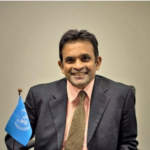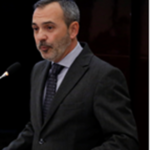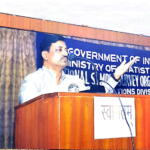NSDS for Bangladesh
Background of the project
The Government of Bangladesh (GOB) approved the National Strategy for the Development of Statistics (NSDS) in 2013, together with the Statistics Act 2013, that envisages an “integrated, professional, efficient, and effective NSS, under the guidance and leadership of the BBS and to produce official statistics that meet the current and evolving needs of national and international users in a transparent and timely fashion using international standards”. The NSDS Implementation Support Project (NSDS Project) is as an Investment Project Financing operation funded by the World Bank supporting the implementation of key elements of the NSDS strategy.
The objective of the NSDS Implementation Support Project (NSDS Project) is to improve the capacity of the Bangladesh Bureau of Statistics (BBS) to produce quality core statistics and make them accessible in a timely manner to policy makers and the public.
To achieve this objective, the project is organized in five components:
- Improving the Coordination and Management of Statistical Activities;
- Developing Human Resources and ICT Infrastructure to Produce and Manage Data;
- Improving the Coverage and Quality of Core Statistics Required for Policy;
- Promoting and Strengthening Access to and the Use of Official Statistics;
- Project Management.
The project will build on the progress made thus far in some reform areas of the NSDS while complementing investments by the Government of Bangladesh (GOB) and other development partners (DPs).
Scope of Services and Deliverables
The project objectives will be achieved through a mix of different advisory and capacity building activities conducted both onsite and offsite by a team of experts. These include:
- Provide technical advice, hands-on-training, analytical support, share knowledge and discuss with BBS staff across the various subject matter domains of the project;
- Study visits by BBS statisticians to centers of excellence and conferences in statistics outside of Bangladesh;
- Workshops and seminars in Bangladesh with participation of local and international experts in various domains of statistics.
An important part of the consultancy is to coordinate activities across all the project components and all the Wings of BBS so that the investments under the NSDS Project are transversal in nature. Below is a description of the deliverables expected from the Twinning Partnership organized by project components.
Project Components | Deliverables from Twinning Partnership (TP) |
Component A: Improving the Coordination and Management of Statistical Activities | |
A.1. Improving the coordination with other data producers | |
(a) Creation of a National Advisory Council on Statistics (NACS) to oversee Coordination and Statistical activities of the NSS (b) Development, revision, and improvement of agreements between government agencies producing statistics to ensure efficient interaction and develop data sharing protocols (c) Development of the rules and regulations to improve inter-agency cooperation | Produce a document with the results of reviewing any existing and draft MoUs between BBS and other data producers. The document should include recommendations to improve the MoUs if needed in line with international standards Organize workshops with BBS, other data producers and stakeholders to discuss review of MoUs Produce a document with a review of all relevant laws regulating statistics and administrative data in Bangladesh, including the Statistics Act, 2013 Produce report to increase the use of administrative data for production of core statistics, including 2-3 concrete examples that could be implemented in 2 years’ time Organize workshops with BBS and other stakeholders to share the results of the review and the report |
A.2. Strengthening management systems | |
(a) Improving the BBS’s business processes and workflows (b) Improving recruitment, procurement, and financial management (FM) capacities (c) Introducing quality management guidelines or enterprise resource planning systems | Conduct a functional review of BBS and produce a report with the results of the functional review of BBS, which includes an implementation plan for strengthening management systems, business processes and workflows. The implementation plan will consider production models such as the Generic Statistical Business Process Model (GSBPM), the Generic Statistical Information Model (GSIM) and the Common Statistical Production Architecture (CSPA) Produce a report with recommendations to improve recruitment processes of staff Organize workshops with BBS and other key stakeholders to share results of functional review and recruitment improvements Deliver 2 weeks training to at least 20 staff on quality management guidelines in Bangladesh |
Component B: Developing Human Resources and ICT Infrastructure to produce and manage data | |
B.1. Investing in core skills and competencies | |
(a) Creating an inventory of generic training needs (b) Creating an inventory of training facilities and other sources, courses available, and assessing the capacity of local and regional training institutes that can partner with the BBS to deliver training (c) Developing a training policy and a training program for all staff led by the BBS. (d) Deliver trainings in-house or in the form of study tours and/or advanced programs by other institutions | Organize a workshop and produce a report for key BBS staff to share the international experience on training policies for statistical agencies Develop a training policy to cover all BBS staff, especially women and those in the field offices (Division, District and Upazila level) Guided by the training plan, create an inventory of training facilities and trainers in Bangladesh that can partner with BBS to deliver training Produce a comprehensive training plan based on the training policy for BBS staff Guided by the training plan, develop training curricula to deliver the basic training Delivering the Subject matter training and develop training materials in English and Bangla, the materials should be in paper and in presentations for self-learning online for the officials of BBS |
B.2. Investing in Information and Communications Technology | |
(a) Developing a comprehensive ICT plan (b) ICT investments (e.g. software and hardware) to improve the efficiency of data collection and sharing of core statistics | Develop an improved website that allows easy navigation, access to key statistical products and user support services. This includes access to metadata, publications, and a system to accessing micro data and other statistical products in a user-friendly manner guided by dissemination policy Prepare a comprehensive ICT plan with implementation steps that is consistent with the findings of the business process review, review of core statistics and training program. The ICT plan will help BBS make the right ICT investments to increase efficiency in statistical production and data dissemination, including the pilot of total automation (from data collection to data dissemination) |
Component C: Improving the Coverage and Quality of Core Statistics required for Policy | |
(a) Reviewing of statistical activities to identify gaps and redundancies and streamline production in line with international standards (b) Making available technical assistance and piloting activities to improve core statistics | Conduct a baseline review of statistical activities and develop an improvement plan to suggest improvements in core statistics and their production in line with international standards Provide technical assistance and conduct pilots to improve core statistics by at least 40 percent from baseline. These, in general, include: (a) improve definitions, classifications, methodologies and questionnaires; (b) improve sampling design; (c) introduce Computer Assisted Personal Interviews (CAPI)/Computer Assisted Field Entry (CAFE) for improved efficiency in data collection, quality and management; (d) introduce quality framework for improved supervision during data collection; (e) introduce mechanisms to speed up data processing. Some of the improvements needed have been identified as part of the development of the NSDS or under the technical assistance provided by the World Bank to BBS in previous engagements and are listed in Annex 1. The TP will build further on these based on the improvement plan and after consultation with BBS and the World Bank. Develop manuals of the new or improved methodologies for the production of core statistics Develop a common guideline for ensuring the quality of the core surveys following the international best practices. |
Component D: Promoting and Strengthening Access to and the Use of Official Statistics | |
D.1. Implementing an effective and clear dissemination policy | |
(a) Introducing a dissemination policy for core statistics (b) Preparing and following a ‘release calendar’ for core statistical operations and reports (c) Improvement of accessibility to microdata, metadata, publications, and other statistical products through the BBS website (d) Improvement of user-producer dialogue | Baseline user satisfaction survey Develop a draft release calendar for core statistics and reports Produce a document with the final release calendar to be published in paper and in the website Develop a system to update the release calendar in the website. The survey will be implemented and analyzed by an independent firm/consultant |
D.2. Documenting statistical activities and providing better access to metadata | |
(a) Training of all relevant staff on preparing and maintaining metadata (b) Adhering to internationally accepted formats for metadata, such as the Data Documentation Initiative (c) Making available relevant metadata on the BBS website, as well as in printed form for core statistics (b) Making available codes/syntaxes that produce core statistics for replication and to enhance transparency | Develop dashboards, data visualization tools (charts and maps) and downloadable tables in Excel for making relevant metadata on core statistics available to all users on BBS’s website |
D.3. Expanding access to microdata for further research and analysis | |
(a) TA and training on microdata anonymization | Develop document with a policy to protect confidentiality, security and prevent misuse of data Provide technical assistance and develop manuals to anonymize all microdata on core statistics |
Project Team

Romesh Paul
Team Leader
Mr Romesh PAUL has 31 years of experience gained working at national statistical institutions (UK Government Statistical Service), with international organizations (ASEAN Secretariat, World Bank, United Nations, COMESA, ECOWAS, CARICOM, Eurostat, etc.) as well as with Ministries in various countries. He has 25 years of experience in the project management and implementation of multilateral and bilateral projects funded by various donors in the areas of official statistics. Mr Paul has practical team leadership skills developed while working with programme beneficiaries to define project objectives, monitoring tools, development of promotional documents, project websites, information management systems, use of new media and public relations. In his capacity as Team Leader and lead statistics expert for EU-ASEAN Statistical Capacity Building Programme (EASCAB) and Capacity Building Project for Monitoring Integration Progress and Statistics (COMPASS), he provided technical assistance to all the 10 ASEAN Member States for strengthening their statistical production and dissemination capabilities and the quality of their outputs.

Jose Luis Cervera Ferri
Coordination and Management Expert
Mr Jose Luis Cervera-Ferri holds a MSc in Mathematics (Statistics and Operations Research) and has a remarkable experience within National and International Statistical Institutes, plus a notable experience as consultant in statistical sector, out of which three experiences as team leader. Mr Cervera-Ferri currently manages and directs DevStat, a consultancy company specialized in the statistical sector, providing technical assistance and consultancy services to Public Administrations in Spain and abroad in the development and reform of National Statistical sector. Mr Cervera-Ferri served as Director for International Relations at the Spanish National Statistical Institute and is a member of several international statistical societies.

Sarwar Jahan
Program Coordinator
Mr Sarwar Jahan, PMP, Bengalese national, is a proven and experienced project manager with experience in Project management and coordination. He is currently CEO of IOE and holds previous experiences as Project Directors within national and international projects. Highly relevant for the current assignment, Mr Jahan has experience in the statistical sector, so that he perfectly matches the technical experience in the statistics sector with the one of a Project Director with know-how of projects’ human resources management.

Nilachal Ray
Price Statistics Expert
Mr Nilachal Ray born in India holds excellent knowledge of Bengali, a Master in Statistics and another one in Economics, plus many post-degree courses in Statistical analysis and computer programming. Having worked for 22 years for the National Sample Survey Organization (National statistical office), Mr Ray specialized in dealing with price statistics and price indexes; moreover, he has worked as external consultant for many international projects in the statistical sector, still dealing with statistics and price indexes.

Driss Afza
Training Development and Policy Expert
Mr Driss Afza has more than 21 years of professional experience in training on statistical methodologies and processes. As a founder and manager of two European training institutes for institutional capacity building for civil servants working within National Statistical Offices, coupled with a remarkable experience as external consultant in the statistical training sector for international consulting companies in the frame of projects implementation. Mr Afza has worked closely with KE3, Mr Cervera-Ferri, in long-term assignments within the MEDSTAT III project, the development of the NSDS for Azerbaijan and other projects.

Pedro Ignacio Lines
National Accounts Expert
Mr Pedro Ignacio Lines holds a MA in Economics, is of Argentinian national, and is currently technical director of the National Institute of Statistics and Census of Argentina. Mr Lines has a deep and proven experience in National Accounts Statistics and documents management, oversees preparing, managing and publication of national accounts statistical data. He is skilled in national time series revision, in producing statistical documents concerning macroeconomics trends and in statistical software use. Having spent almost the whole professional experience within the National Institute of Statistics, he can proficiently and successfully implement requested activities. Mr. Lines worked with DevStat for the development of the training materials of Eurostat course “Essential SNA”.

Bahjat Achikbache
Social Statistics Expert
Mr Bahjat Achikbache has 40 years of professional experience in the social statistics, out of which 24 spent as civil servant in National Statistical Institutes dealing with social statistics, with a focus on demography and health. Notably, Mr. Achikbache has worked for 13 years for Washington D.C. office of World Bank dealing with social statistics: this made him perfectly aware of procedures and regulations of WB funded projects. He then moved to consultancy sector and participated to many international projects in the statistical sector, dealing with social indicators and population statistics. Mr. Achikbache worked closely with Mr Afza and Mr Cervera-Ferri in the context of the MEDSTAT III project.

Crina Sinziana Turtoi
Agriculture Statistics Expert
Ms Crina Sinziana Turtoi holds a PhD in Statistics and IT, and have a very relevant and focused experience in the agricultural statistics, having worked for the National Statistics Institute of Romania, then moving to consultancy sector, and participating to EU and other international donors funded project in the agricultural sector. Ms Turtoi is highly skilled in preparing statistical methodologies and processes in agriculture in Romania, Albania, Serbia, Moldova, Montenegro, Armenia, under team leader position and, remarkably, having also covered the position of Resident Twinning Advisor.

Igor Chernyshev
Labour and Industry Statistics Expert
Mr Igor Chernyshev is a former Head, Yearly Indicators, Decent Work Data Production Unit, of the ILO Department of Statistics (Switzerland), where he worked over 25 years. He was responsible for the developmental work on statistical measures of decent work and quality of employment within the context of the Department’s work programme. His major areas of expertise also include measurement of employment in the tourism industries, preparation and implementation of Labour Force Surveys, international comparison of employment and unemployment estimates, recommendations on the reconciliation of data from different sources, measuring sustainable development with SDGs decent work indicators as well as special topics in industry statistics. Mr Chernyshev worked in more than 50 countries covering Africa, Central and South-East Asia, Eastern Europe, the Gulf States and Latin America. Prior to joining the ILO, he worked as a Deputy Unit Head in the Central Statistical Office of Ukraine. Mr Chernyshev worked with DevStat as a Team Leader of the WB NSDS statistics support project for Tajikistan.

Silvan Zammit
Population and Housing Census expert
Mr Silvan Zammit has been working at the National Statistics Office in Malta for more than 19 years, where he is now Director of the Data Capability Directorate, covering the Census of Population and Housing, methodology, quality, data management, information technology and security. Graduated in 2002 from the University of Malta with a B.Sc. Honours Degree in Mathematics, Statistics and Operations Research, Mr. Zammit built his career in a variety of roles in this area, and this interest led him to pursue his post graduate studies in Actuarial Techniques to broaden his perspective and study uncertainty and risk from a practical perspective. Being involved in the 2005 Census and appointed as deputy Census Officer in the 2011 Census, he will now lead the 2021 Census and take responsibility for all activities from its coordination to the data analysis and publication of results. Mr Zammit is also a Lecturer at the University of Malta, where he teaches Official and Business Statistics in a number of faculties. His experience in delivering lectures and training courses to others, as well as serving as an expert in thematic fora in foreign countries, has given him the chance to effectively deal with persons and their demands and to apply statistical theory into practice to enhance statistical literacy.

Christine Alberti Schmitt
Information and Communication Technology Infrastructure Expert
Ms Christine Alberti Schmitt, French national, is a highly specialized expert in the IT and statistical sector. She holds a M.Sc. in Computer Sciences, and many certifications on programming. Ms Alberti Schmitt worked for 10 years within CESD-Communautaire in Luxemburg, International Statistical Institution, where she was responsible for the implementation and management of IT statistical system; she then undertook consultancy work as external expert, dealing with the support to many National Statistical Offices for the improvement and further development of IT statistical systems, developing ad hoc ICT plan for innovative and enhanced data system. She is also highly experienced with multimodal data capture system. Highly relevant for the current project, Ms Christine Alberti Schmitt has already worked in the past with our proposed Team Leader, Mr Romesh Paul, and with our proposed KE3, Mr. Jose Cervera-Ferri.

Mogens Grosen Nielsen
Promoting and strengthening Access to and Use of Official Statistics Expert
Mr Mogens Grosen Nielsen will closely work in cooperation with KE11 and other experts, being highly specialized in quality, dissemination, metadata documentation, microdata anonymization and related ICT tools. Remarkably, Mogens Grosen Nielsen has 30+ years experience working at Statistics Denmark and as a consultant for statistical organisations in Europe, Africa, Asia, Latin America and Middle East. He has comprehensive theoretical and practical expertise in the efficient and standardised production and dissemination of official statistics fulfilling user needs. This has been achieved via tailoring Generic Activity Model for Statistical Organisations (GAMSO), the Generic Statistical Business Process Model (GSBPM), Fundamental principles of Statistics from UN, Code of Practice (CoP), Quality Assurance Frameworks, the Generic Statistical Information Modell (GSIM), Data Documentation Initiative (DDI), Statistical Data and Metadata eXchange (SDMX) and other related statistical standards. In addition, tailoring of architecture and project management approaches played important roles. As head of quality and metadata he was responsible for creating an integrated quality and metadata management system in Statistics Denmark.
Link to documentation of Statistics..
Project management team
DEVSTAT
- Jose Luis Cervera Ferri – Project Director
- Dovile Minkeviciute – Project Manager
IBF
- Luca Costa – Financial Manager
- Maeva Mottin – Financial Controller
- Silvia Stuffmann – Mission Manager
IOE
- Aftabul Islam – Communication and visibility coordinator
- Mahbubur Rahman – Local training coordinator